by Mayumi-H | Jun 8, 2014 | From Hell (A Love Story), Persona 4 Fan Fiction, Process
Last time, I talked about writing villains. Everybody had great comments, but Vanessa’s sparked a new idea in me. In my head (sometimes on paper), I have backstories for every character who walks onto my pages for any more than a sentence or two. Most of these backstories are rather simple, because I don’t see the point in spending too much time on a character who is basically just a spaceholder. But for anyone with any significance to the story, they have their own story. But Vanessa’s insight offered me a different perspective: basically, that we storytellers should remember that every good villain is the hero of his or her own story.
Now, this doesn’t necessarily mean that your villain needs to have heroic traits. But, their motivations and characterization should come from a place of realism. The best villains are often ones with whom a reader can personally identify. I don’t know if I managed that with the villains illustrated in last week’s post (actually, I doubt it), but it’s a good characterization technique to remember. So, this morning, I drafted up a couple of would-be storylines for each of those principal antagonists, posted below. If nothing else, it was fun to look at them from a new angle. I’d recommend doing something similar for your own antagonists – you never know when you might be struck with new inspiration.
The Red Widow
It’s a man’s galaxy. That’s what they say. Certainly, it seems that way to a girl sold into slavery for men’s pleasure. But this is no ordinary slave girl. This is one who learns from her so-called “masters”: how greedy, vain, and susceptible men are. Especially to a woman’s charms. Justiciar, pirate, or politician: no matter the insignia on their collar or the banner on their ship, men have their weaknesses, and she knows them all. Her marks have called her many names: Anya, Elsbeth, Illia, Una. But the galaxy knows her better as a woman as smart as any justiciar, as savvy as any pirate, as sly as any politician. It knows her as Red Widow. And she’s going to turn this man’s galaxy upside-down.
Into the Light (Lohengrin, the Swan Knight)
Abram had a son, once. A bright, beautiful boy full of possibilities. A gentle boy cherished for his kindness and skill with a tanner’s knife. The air would sing with the strokes of that knife, and wealthy women and men would come from across all districts to watch and buy his work. Abram loved his boy. But the Darkness loved him, too.
One day, that Darkness came for him, in the form of another smooth-faced boy, and lured Abram’s son away. Away, into the Darkness. What choice for a father but to save his only son? And the only way to save him from the dark was to lead him back into the light. With fire.
The Darkness has taken other boys. The Lost Boys, they are. But he will save them. He will take up arms and become their knight, to set them free, body and soul. He will be Lohengrin, the Swan Knight, their savior.
The Body Electric (Reilly)
The Dahl Army gave Reilly everything: a job, a purpose, even something like a family. For twelve fine years, he fought, laughed, caroused, and conquered by the sides of his fellow commandoes and their skilful sergeant. But on what is supposed to be a routine grab-and-go mission on Artemisia, the unthinkable happens: the op goes sour. An explosion and fire burns away half his soldierly body. And what does Dahl do? They dump him like scrap.
When the Hyperion salvage team finds him rotting in an Artemisian infirmary, they see his potential, and make him an offer: Become part of the Body Electric, a soldier enhanced for the technological wars. Of course, a soldier with potential needs a purpose, but Reilly has a purpose: hunt down his old teammates who left him to die, starting with his glory-hungry sergeant, the man responsible for it all.
Every Shot a Kill (Strenk)
Walking around the galaxy with the S&S munitions manufacturer family name stenciled on his uniform has never meant much to Lukas Strenk. Guns are just tools, only as good as the man who holds ‘em. And he is a great man, the best in the Inner Ring. Every shot from Strenk’s Orion rifle is a kill. But even the simplest kills can go wrong. When Galactic Defense redacts his latest target assignment after knowing the job’s already been done, they blame Strenk, of course, never mind his 100% success rate and the value of his name. “Get yourself gone or get yourself dead,” the GD Justiciar tells him. Strenk’s only answer is a bullet.
To hell with the shifting, shifty so-called rules of the Inner Ring. When the galaxy gives you lemons, you shove ‘em straight up its gaping *** and lick the residue from your fingers.
Once again, I think Strenk came out on top as my favorite of these, though I enjoyed the exercise for all. Have you ever flipped the coin on your antagonists? Have you ever found you identify more with a villain than a hero in a story? Let me know!
by Mayumi-H | May 17, 2014 | From Hell (A Love Story), Process
The knocks burst a staccato beat through the flat, startling on the first and annoying on every one to follow.
Findlay Raske lurched up from the bed, snapping one drooping side of his pyjama bottoms back into proper place above his hip. “All right, all right,” he called. “The hell is this, now?” he muttered to himself, laying one hand on the door for balance. He pressed his face close to the peephole, blinked against the light from the corridor, and groaned.
“For ***** sake,” he said, unlocking and swinging open the door regardless. “Kris, you can’t keep coming round like this! Do you even know what time it is?”
“Three-eighteen,” Kris replied. Not with his typical clipped delivery, though. He actually slurred.
“Christ,” Finn said, wrinkling his nose. “You’re drunk!” He gripped the door handle and started to swing it back. “You know what? Forget it. I’m done picking up your pieces-”
“Hanne’s dead.”
Finn stopped, the door forgotten. The discourteous wake-up call, too. Even the smell of cheap whisky blown on the air between them. Everything except those words…and the red film across Kris’s should-have-been blue eyes.
“Come on,” Finn murmured, settling one hand on Kris’s shoulder and leading him inside. “I’ll make us some coffee.”
Kris nodded and shuffled over the threshold into the flat. He made his way to the kitchen on his own, Finn following at a three-pace distance to gauge.
The years since his unceremonious resignation from the police department – a detective sergeant’s career and pension made worthless because of a few too many unsolicited opinions of proper procedure and conduct – had made Kristoff Stenhall hard-edged and skeptical, but nothing to plunge him into this sort of self-destructive depth.
With a low-blown sigh, Finn stepped around him and moved to the counter and sink. He filled the kettle, pulled out the press, and brought out the coffee tin, all in silence. He scooped one, two spoonfuls into the carafe but froze on the third, for the feel of Kris’s arms around him.
The metal zip of the jacket chilled the small of his back, causing Finn to suck a breath that straightened his spine. He let it go a moment after, though, for the warm, wet blow of Kris’s voice over his neck:
“I need you.”
Finn set the spoon on the counter and turned, pushing an excuse to his lips. But he got only as far as saying Kris’s name when the other man silenced him with a kiss.
The next time Finn spoke, the clock next to the bed read three fifty-seven. He’d had to glance over Kris’s head, resting on his chest, to see it.
“I’m sorry about Hanne.” He stroked his fingers through Kris’s coarse fringe, sweeping it back behind his ear with little success. It drifted loose a second after, falling once more into his eyes. Finn did it again, undiscouraged. That was Stenhall, after all: never anything easy. “I know you were fond of her.”
Kris kept the point of his focus on a space of wall past Finn’s shoulder, blowing a series of slow, steady breaths across his chest. It cooled the fine layer of sweat there, making his nipples harden.
Finn watched him blink a minute before venturing, “Do you know…how…?” He craned his head down for the lack of answer, prompting, “Kris?”
“Murder.”
Finn frowned, not least for Kris’s plain, hard tone. He’d never particularly liked Hanne Rolig – she’d always been able to exert too much influence over Stenhall, even after his resignation – but no one deserved to have their life snuffed out with such callous disregard for their future possibilities. And, despite any conflicts they may have had over their personal choices, Rolig had been a good detective: fair, clever, and concerned with the truth. Finn couldn’t help but admire that.
“I’m sorry,” he said again. “Whatever you need-”
“I need you,” Kris repeated, as the muscles in his arms and back went taut. He pushed himself up from Finn’s chest and looked straight at him. The same redness as before still darkened his eyes, but the blue beneath shone clear and hard as crystal. “I need you to help me find out who did this.”
Many folks say we should write outside our boundaries. If we’re comfortable writing action, try romance. If we always write romance, jump into sci-fi. If sci-fi is our gig, go back in time for some historical biography. As for me, I love reading crime and heist stories, especially adventure-y ones, but I can never pull them off. My mind simply isn’t clever enough to create a mystery or conflict suitable for a detective story.
Above is yesterday’s free-write. I’d hoped to see where a spark for a detective story might take me. As you can see, not very far afield of where my usual interests lie: the human drama. I couldn’t help my brain: I’m drawn more to passionate conflicts and conflicted passions than I am to procedural plot. Still, I like Kris and Finn (and Annie, who wasn’t intro’ed here but who’s been jumping around in my head as I’ve gotten these two gentlemen sorted). I just wish I were smarter, so I could give them a strong story worthy of the affection I already feel for them.
How do you push yourself into new territory?
by Mayumi-H | Dec 14, 2013 | Fearless, From Hell (A Love Story), Process
So, as some folks know, I’m writing this sci-fi western story based on a videogame universe. Blah blah blah, I know, it’s fan fiction and not real writing, whatever. I’m still having a blast with it, and just one of the reasons why is it’s given me a new perspective on some old characters.
For those who read “Anywhere but Here,” my 2012 NaNoWriMo project: Remember Tych and Imien? They were the pilot and the cypher, the secondary runaway characters following the two mains in the teenager half of the story. (Don’t worry if that’s confusing. It’s not important for this post.) Anyway, I came to a point in my current story, “From Hell,” where I needed a getaway ship. At first, I’d planned to model the ship’s captain on the character VT from the seventh session (episode) of the anime Cowboy Bebop, “Heavy Metal Queen.”
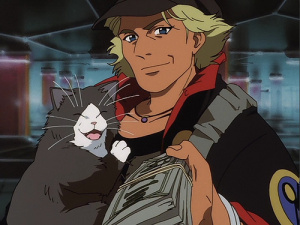
– screen capture: “Cowboy Bebop” –
If you’ve any interest in anime, sci-fi bounty hunter stories, or jazz music, check out Bebop. But, again, not important to this post.
In playing around with the different interaction scenarios between the main characters of “From Hell” and the ship’s captain, I realized the ship couldn’t have just one crew member. So, I developed a daughter for Janus (that was going to be the captain’s name). On the story went, but neither Janus nor the daughter character really took hold with me. The daughter, by the way, never even got far enough in my thought process to get a name. That should tell you something about how well that subplot was going.
One afternoon, I was sitting at my writing desk working on designs for the ship. (That went through a few permutations, too.) I stumbled across an old sketch I’d made of the Ridout, the smuggler’s ship from “Anywhere but Here.” Never one to pass up the opportunity to save the world from my terrible vehicle sketches, I considered my work on the new ship done. And, quite suddenly, it hit me.
I already had a smuggler crew, all ready to go, fleshed out and everything. Enter Tych and Imien…or, as I renamed them, Twitch and Ivory. I’d always liked the Tych and Imien characters, but their personal stories never got any deep attention in “Anywhere but Here,” focused as the story had been on the more major plight of four teenagers on the run from the galactic government. Bringing them into “From Hell” offered me a chance to examine their personalities in a more acute light. Plus, their own conflict, such as it is, relates well to that of the main characters…who are also on the run, now that I think about it, but that’s a thought for another time.
Of course, Tych and Imien had to go through some changes to make the jump from one universe to the other, but I couldn’t believe how stupid I’d been not to consider reusing these characters before! I’d borrowed pieces of other characters to create new ones before – I think every writer does that, at least at a subconscious level. For instance, the second principal character in “From Hell” – Hal, Axton’s engineer partner – developed from a mishmash of Amber from Fearless (cultured and sensitive, but also an elitist snob), and the Brock and Captain Aral characters from “Anywhere but Here” (sharp, loyal, a know-it-all techie, but afraid to pull a trigger). In turn, those characters developed from ones to come before them. I could draw up a whole family tree of where my characters come from…but it would probably be as confusing as the Baratheon/Lannister line of heirs!
I had to bring this up because I’m just having so much darn fun writing this story, and I wanted to share some of my excitement. I’ll go back to more serious stuff next time. Maybe.
Do you recycle characters?
by Mayumi-H | Nov 30, 2013 | From Hell (A Love Story), Uncategorized
(Mostly recycling from Tumblr again, because, after a long week spent helping care for my dad, who’s still going through chemo, I just don’t have the energy to put forth a completely new post.)
In a recent post over at Kourtney Heintz’s Journal, Kourtney brought up the idea of which actor might play which character from her book, Six Train to Wisconsin. While this is different from the idea of who or what may inspire a character, it did make me realize that many of the characters – notably the female ones – from my most recent story were actually based on specific looks and performances.
In “From Hell,” the main character’s appearance has already been determined for the reader, because he’s a borrowed likeness:
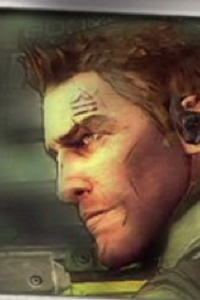
-Axton, the Commando from “Borderlands 2”-
The story may be about Axton, but there’s a slew of women in the supporting cast whom I’ve just adored writing. Among them:
Cin, the charming and sensuous madam who runs the brothel “Cin’s Deadly Seven,” and who was based on gorgeous Adrienne Barbeau’s Ruthie from “Carnivale,” complete with slithering snake tattoos;
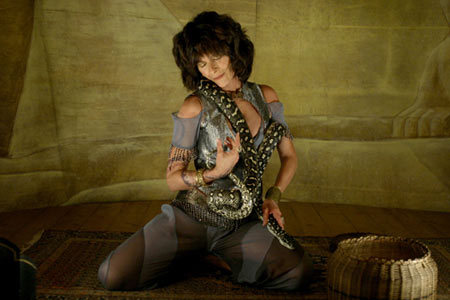
-Carnivale publicity photo-
Red Widow, the cunning, discerning, and dangerous grifter who gives Axton a full-on run for his money in the sexuality and profanity departments (inspired by Gail Potocki’s beautiful and intimidating art below);
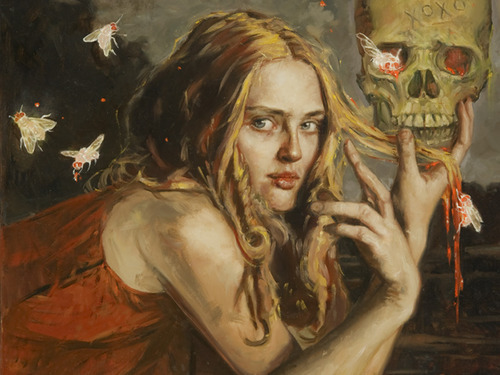
-by Gail Potocki: “Femme Fatale” Cella Gallery show press image-
Marshal Kotonou, who wears a duster and wields a shotgun as well as any man, for protection of her borderworld town (and to whom I’ve attempted to give a nod of attitude and beauty to Gina Torres’s Zoe from “Firefly);
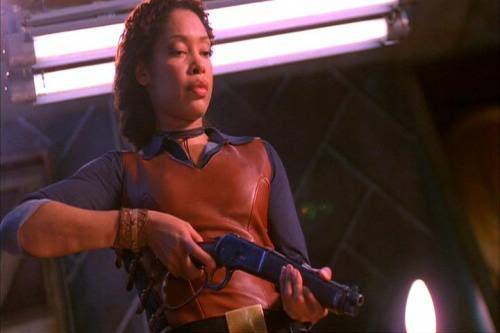
-“Firefly” publicity photo-
Lucy, the practical and sassy prostitute who has better insight into the main character’s head than he does, himself (based on the luscious Patricia Arquette’s portrayal of Sally Wheet in “Boardwalk Empire”);
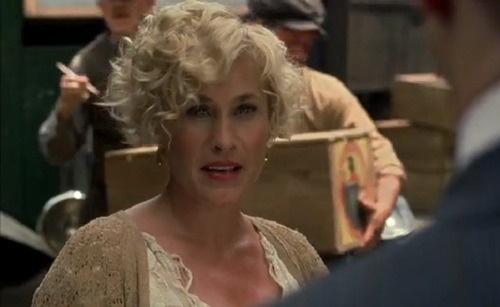
-screen capture: “Boardwalk Empire”-
and Sarah, the main character’s ex-wife from his military days, who provides some telling background about why he is the way he is (inspired by the many roles of lovely singer/actress Ana Brenda Contreras).
Oh! And, of course,
Gaige, the girl who starts the whole story rolling (head on over to
Contagious Media for the full photoshoot)…

-Gaige cosplay by ContagiousMedia-
Stories about men tend to focus on just the men. Especially in the Western genre, where supporting women can fall into pretty predictable (and often hackneyed) categories. The women Axton encounters throughout the story might exist within those same categories, but I hope I’ve added some new dimensions to a few of them. They’re just so much more fun to write, that way. Hopefully, readers are enjoying the women in this story, too. Because, really, what’s a man without a good woman, whether she’s there to screw, fight, or be his conscience?
From where do you get your character inspirations? If you could cast anyone as one of your main characters, who would it be?
by Mayumi-H | Oct 19, 2013 | From Hell (A Love Story), Process
A few weeks ago, I put up on the blog an excerpt of a fight scene I was having trouble with. Based on your feedback, I made some changes to the text, ones I hope create a smoother experience for the reader. Do they or don’t they? I’ll let you be the judge. (Clicking the image below will let you read both the original and updated versions, the latter of which I posted for readers just this past week, coincidentally enough.)
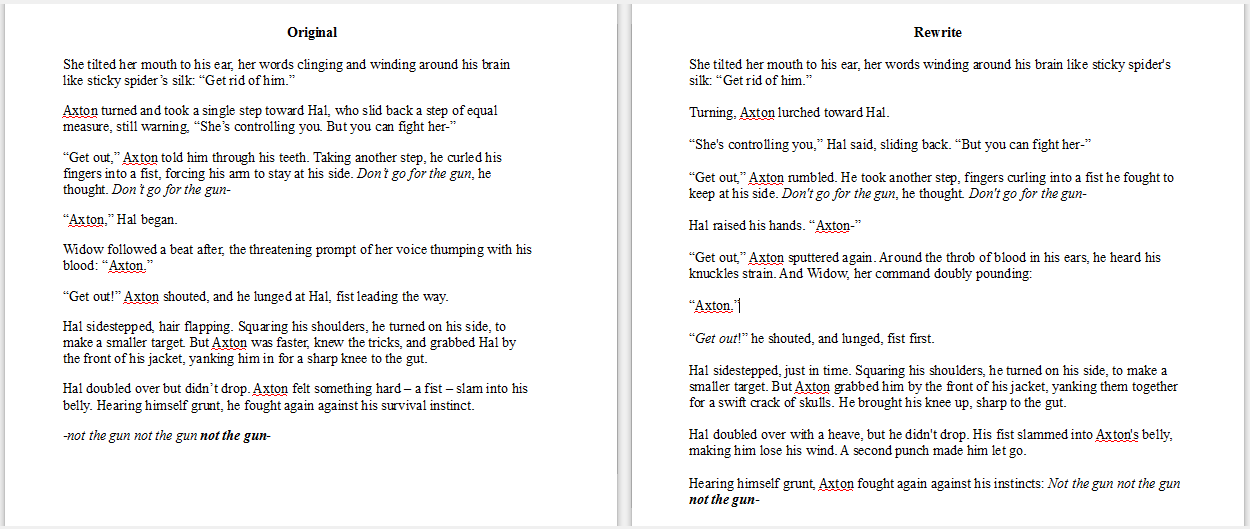
I like to think the update works better within the confines of the chapter…but I’m never sure. Because working from feedback has always been difficult, for me.
I like getting critique, especially if it can help my story become better: tighter, clearer, more effective. But, I spent a large part of my early writing life aping others. My sister first, then my favorite published authors. To this day, when I read books while I’m in the middle of writing a story, I find myself incorporating others’ techniques and quirks. It’s been said imitation is the sincerest form of flattery. Though, when does imitation go too far, and we lose our own voice to the art?
I like my voice. It varies from story to story (admittedly, less successfully when I drag out a story for too long), but I like thinking of my stories as my own. When I get critiqued – especially when it’s good critique – I always hesitate. “If I change this phrase to x, will I sound more like A? If I edit that section to y, is my voice becoming like B?”
Even though I may not be destined for publishing, I still want my story to be the best it can be. So, in some cases, writing like favorite author A or insightful reader B might be better. But, does that make a story less mine, less me? I don’t know.
In the face of solid critique, how do you remember to keep to your own voice?
by Mayumi-H | Jul 20, 2013 | From Hell (A Love Story), Uncategorized
Overnight station shifts often meant solitude while he waited for a call to come in, a trial Scott considered a lonely necessity at its best and a nerve-wracking tedium at its worst. Some of the other men on the squad appreciated the quiet away from wives and children. Not Scott. Noise and commotion had become a part of his life these last seven months, but it was worth it for the blessing of little Emma.
Finchy wasn’t nearly as exciting to be around as his daughter (or his wife), but he was company to keep the silence and boredom at bay well enough. And, he seemed lonely, of late. He was also a more than passable cook, so his offer of bringing supper to the station to hang out was one Scott couldn’t refuse.
“That was great, mate,” Scott said as he eased back a bit from the duty desk. “Thanks.”
“Sure,” Finchy replied easily, and took a long swig from his water bottle.
Looking at his empty plate, Scott chuckled. “I love my wife, but I’m lucky she knows how to use a microwave. You’ll make some lady very happy, some day.”
Finchy blew a snort from around the mouth of his bottle. “I don’t think there’s any woman to satisfy me that much.”
“You just haven’t found the right one, yet.”
“Yeah,” Finchy muttered in a lazy drawl. “Rub my nose in it.”
“Maybe you’re looking in the wrong place,” Scott told him. “There’s a lot more than just this village, you know. I mean, I didn’t meet Venus here.”
“I know,” Finchy said. “I was there, too.”
Scott fell silent, reminded of that flashy, crowded club on the first night of Newquay’s Blue Surf competition almost three years past, where Finchy had spotted that Black beauty with the killer smile and unflappable attitude. Every member of their crew – save Neville – had tried to pull her, with no success. Of course, the next day, they’d found out she was a surfer in her own right: Vee, they called her, “for Victory,” though she’d introduced herself to Scott in particular as Venus Pritchard. Thinking back on it, now, his scores that comp had been shit…but he’d had a hell of a night in her bungalow to make up for it.
Lost in those memories a moment, he didn’t notice Niall swoop in from the outside and plant himself in the other seat across the desk until he opened his mouth:
“Did you know Nev is-” He dropped his voice. “-a poofter?”
Scott looked at him in mild surprise, while Finchy furrowed his brow and said, “Yeah, I know. And don’t call him that.”
“Whuh-!” Niall said, leaving his mouth hang open a second. “You knew? How long have you known?”
Finchy shrugged. “He told me, like, two years ago.”
Niall pointed at Scott. “Did you know?”
Scott nodded, feeling a bit lame. “Yeah. He told me and Venus a while ago, too.”
Niall fell back against his chair. “Did everybody know but me?” He turned to Finchy. “Why didn’t you tell me?”
“Why?” Finchy said, and raised his brow with sudden interest. “Are you gay, too?”
“No!”
“So, if you’re not interested in him, why should you care?”
Niall paused a second, his face gone blank; Scott figured he hadn’t thought that far. Of course, he didn’t usually think at all….
“Well,” Niall struggled out, now. “What if…What if he fancies me?”
“He doesn’t,” Finchy replied readily.
“How’d you know?”
“Because no self-respecting human – gay or straight – would ever fancy you.”
“All right,” Scott muttered, extending one hand. “That was a little uncalled-for. We all have to work together.”
“That is exactly my point!” Niall said, pointing one finger around at them again, as he half-stood from his chair. “I-! I mean, we all are in…very close quarters…a lot, and…well, sometimes, I don’t wear anything under my suit, and what if, you know, when I take it off, that’s, like, too much a temptation for him? Or something?”
“Jesus!” Finchy said, scolding. “He’s not a rapist.”
Niall went from looking ill at ease to pained. “No, I’m not saying that, but-!”
“Listen,” Scott told him in a low voice, leaning across the desk. It felt a bit like speaking with a special needs child, but Niall did have some special need, at the moment. “Nev’s always been this way. You’ve known him for years, and it’s never bothered you before.”
“Well, I didn’t know before!”
“What difference should it make? He’s still Nev. He’s still ace on his board, and he’s still our mate! The way you feel about him shouldn’t change just because you suddenly found out he’s gay.”
Niall paused, as though thoughtful. Scott couldn’t easily tell; the look of contemplation on his face was so foreign.
“Yeah,” Finchy said then. “You’re an idiot, but that doesn’t change the way I feel about you.”
Shooting him a guarded look, Niall murmured cautiously, “How do you feel about me?”
“You’re an idiot,” Finchy repeated, making Scott snort a chuckle under his breath. Then, sitting up from his lackadaisical lean, he added, “And another thing: Whenever you go straight skins under your suit, you don’t take that off in front of any of us. Nobody wants to see that!”
Earlier this week, news came of the passage into law in England and Wales the ability for same-sex couples to marry. Some stipulations still apply, of course, because government doesn’t make anything easy, these days. But, it’s a step forward toward the equality that should have existed for couples of all variations years ago. Here in the US, the status of a person in general – including marriage – is determined by the individual states, so it creates a much more divided issue, depending where you happen to live.
I won’t get into any controversy of marriage – or laws associated with it – here. The news did prompt me to scribble down this bit of free writing, though, which I always appreciate, no matter what the impetus.
I’ve always seen Scott as “the dad” of the crew. Because he is one, but I also thought his perspective – coming from being in an interracial relationship – gives him an extra insight into other less traditional romances. And, I like the idea of hearing from some of the supporting characters in the story.
As for Niall…. Poor Niall. At heart, he’s a good guy. He’s just…not terribly quick. I hope his struggle with his own articulations, here, paints a picture of someone who’s just a little confused, not truly bigoted, especially against a friend.
Now, it’s stiflingly hot, here, so I’m going to grab my own wetsuit and head for the beach. And maybe I’ll go skins, too.
How do love and marriage figure in your stories, if at all?







![Photo by Valeriatroche (Own work) [CC-BY-SA-3.0 (http://creativecommons.org/licenses/by-sa/3.0)], via Wikimedia Commons](https://24.media.tumblr.com/763f4005039c2534c7d2bb0fe86fa3c5/tumblr_mwjg29ZOyX1qgv9sto1_400.jpg)



Recent Comments